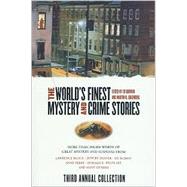
| Acknowledgments | p. 13 |
| The Year in Mystery and Crime Fiction: 2001 | p. 15 |
| A 2001 Yearbook of Crime and Mystery | p. 31 |
| World Mystery Report: Great Britain | p. 43 |
| World Mystery Report: Australia | p. 49 |
| World Mystery Report: Canada | p. 51 |
| World Mystery Report: Germany | p. 53 |
| The Year 2001 in Mystery Fandom | p. 57 |
| Double-Crossing Delancey | p. 61 |
| Activity in the Flood Plain | p. 83 |
| The Only Good Judge | p. 103 |
| Speaking of Greed | p. 117 |
| The California Contact | p. 159 |
| Tell Me You Forgive Me? | p. 187 |
| Beautiful | p. 213 |
| Unreasonable Doubt | p. 229 |
| Lucky Devil | p. 247 |
| The Star Thief | p. 253 |
| Chip | p. 271 |
| Come Again? | p. 279 |
| Dark Mirror | p. 295 |
| The Adventure of the Cheshire Cheese | p. 307 |
| Dry Whiskey | p. 317 |
| Countdown | p. 329 |
| Old Dog, New Tricks | p. 333 |
| The Wink | p. 343 |
| Fire Works | p. 351 |
| Juggernaut | p. 355 |
| Star Struck | p. 365 |
| Known unto God | p. 375 |
| The Eye of the Beholder | p. 385 |
| Blind Alley | p. 405 |
| Canon | p. 413 |
| A Well-Respected Man | p. 429 |
| The Girl Who Killed Santa Claus | p. 443 |
| The Trebuchet Murder | p. 449 |
| Turnaround | p. 467 |
| Out like a Lion | p. 483 |
| The Perfect Man | p. 497 |
| Conscience | p. 525 |
| Living Next Door to Malice | p. 531 |
| The Good Old German Way | p. 537 |
| The Case of the Bloodless Sock | p. 543 |
| Blood, Snow, and Classic Cars | p. 561 |
| The Impostor | p. 585 |
| The Problem of the Yellow Wallpaper | p. 599 |
| In the City of Angels | p. 615 |
| Honorable Mentions | p. 637 |
| About the Editors | p. 639 |
| Table of Contents provided by Syndetics. All Rights Reserved. |
The New copy of this book will include any supplemental materials advertised. Please check the title of the book to determine if it should include any access cards, study guides, lab manuals, CDs, etc.
The Used, Rental and eBook copies of this book are not guaranteed to include any supplemental materials. Typically, only the book itself is included. This is true even if the title states it includes any access cards, study guides, lab manuals, CDs, etc.